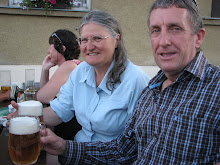Arrived at San'a airport at 1.30 am and had to get a visa and then took a taxi we had prebooked to our hotel in the old city.
San'a is so different from any other place we have been. It the oldest city in the world, according to books we have read. Noah's son was the founder of San'a. Today it is the fastest growing capital city in the world.
The buildings are probably the first skyscrapers. They are towers. The ground floors are built of stone and the rest of the floors of mud brick. Traditionally the stables and storerooms were on the ground floor. The first floor was for entertaining. The second floor was for the women and children and the third and fourth floors were the bedrooms, bathrooms and kitchen. The top floor was the room with a view. Most towers are 6 or 8 stories.

Our hotel was a traditional building and the dining room was on the top floor. The windows are decorated with coloured glass and set in plaster and we could look over the old city. The white lime wash on the building help reflect the heat and keep the rooms cool. There are still 14, 000 original tower houses in the old city.

We contacted Victor, a Yemeni, from the Hospitality Club, an online group that offers accommodation or friendship to others in the club. He works for a Canadian oil company and has one month on and one month off. Our request to stay with him and his family arrived on his month off so after recovering from our flight at the hotel we were picked up by Victor and Asia and their two children, Ahmed (7) and Noor(5).

We had a great time with the family, with Asia cooking some delicious Yemeni food and Victor introducing John to the ways of life for Yemeni men.

Yemenis are traditional Muslims and Asia has to wear black covering her head, arms and legs with a veil across her face. She kept her head covered the whole time John was in the house but was uncovered if I was there with her. We went shopping one afternoon with the children and the men went to chew qat. The shopping centre had only women shoppers.
Qat or Khat, are the leaves of the Catha edulis shrub. It has the ability to slow down time. The WHO classes it as a drug of abuse that can produce mild to moderate psychic dependence, and is banned in most Arab and Western countries. About 80% of the Yemeni male population chew qat regularly. The towers beside each plantation are to house the guards that keep watch over the trees.

John and Victor went to a stylish Yemeni house where they sat in a room furnished with squabs on the floor and upholstered cushions against the walls. There were bolstered arm rests between each person and the men sat around the sides of the room. There was a large TV screen and the men drank water, soft drinks, smoked and chatted. About 50 people came and went between the 4pm to 8pm session. There were several professional people and John talked to men from insurance, an IT analyst for the military, engineers, and other government workers. It is a time to talk politics and right the wrongs of the world.
Victor told us later that some of the men at the qat house were from a tribe that recently kidnapped a couple of Dutch tourists. These guys asked Victor if he had any grievances with the government that he would like put right. If so, then they would kidnap John in order to get the government to do do something about the grievances. Lucky for John, Victor had none.
Environmentally, qat is bad news for Yemen. 55% of all the water in Yemen goes to irrigate the crops. In 1970, 8,000 hectares was used for qat but has now grown to 103,000 hectares and there are still new areas being developed. The profit is 5 times better for qat growers than for crop farmers. When you walk through the old city after lunch you see all the stall holders with huge bulges in their cheeks as they stuff the qat in. Young boys also get into qat chewing at an early age. Some women chew qat as well but not as much nor as often as the men. 17% of the average family's income goes on qat with over 14,622,000 working hours lost each day in Yemen, as men set aside chewing time.
Ahmet and Noor were very quick to pick up new words in English and try them out. We made origami boxes, played string games and 'paper, scissors and rock'. I helped Asia with her English lessons. She goes to a language school two hours every day and was shy at first to speak but is doing really well. We met Victor's mum and a couple of brother as well as Asia's brother who drove us in his taxi.

Near the gate of the old city we saw a blind-folded camel going round and round. It was attached to an arm like a pestle and it was grinding sesame seeds for oil. It had been walking about two hours when we saw it and it stopped for awhile and then continued. Apparently it wouldn't walk if it could see it was going in circles.

There is a river bed that is cobbled and sealed and the traffic use this everyday. When it rains once or twice a year the road becomes a river.
The men in this area wear knives attached to their belts and they pull them out at weddings and use them for dancing. Even young boys have them. Victor doesn't wear a jambiya as it is not the tradition where he comes from.
